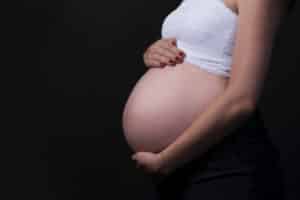In this article, I want to talk about listeria infections, bacteria we don’t really hear about in the general population, but something that pregnant women need to consider during pregnancy. Why is listeriosis so important during pregnancy?
After reading this article, you will better understand the health advice given to you at the start of your pregnancy to prevent risks associated with listeria infections. It can be dangerous for you, your pregnancy and your baby.
The Listeria Bacteria
The listeria bacteria is found in the ground, untreated water, infected animal stool and in some foods.
Since these bacteria are frequently found in the environment, you can eat foods contaminated by it and yet not develop an infection. That is why the infection is rare in the general population.
Listeria infections affect people who have a weaker immune system, such as:
- Seniors;
- People treated for cancer;
- People who have had transplants;
- People on dialysis;
- Pregnant women;
- Newborns.
In Quebec, the illness must be declared to the Institut de Santé Publique du Québec to monitor its presence in the general population.
What are the signs of listeriosis?
What are the signs of listeria infection? A pregnant woman can be infected by listeria but show no signs, yet infect her baby. Despite this fact, there are no general guidelines that this bacteria should be checked for regularly as it is relatively infrequent. Only people with symptoms will be examined further.
I also think it’s important to mention that if there are symptoms, in most cases they will appear 3-30 days after exposure to the bacteria. This can extend up to 70 days after infection depending on the history of infected persons.
The first signs appear in the digestive tract since the infection takes place there. The appearance of temporary diarrhea and other digestive issues are a sign, but we usually are concerned about being infected because these are general occurrences in life.
If the infection propagates beyond digestive functions, symptoms can appear and affect other systems, such as your neurological functions.
The most probable clinical signs often resemble flu-like symptoms:
- Headache
- Feverish state
- Shivers
- Generalised muscle pain
- Back pain
- Nausea
- Vomiting
- Potential behavioural issues.
Listeriosis Diagnosis
Frequently, a listeriosis diagnosis for a pregnant woman will be made through a blood test. By testing the sample, the health professional will see if the listeria bacteria is present or not.
They can also do a lumbar puncture to test the cerebrospinal fluid, or take vaginal samples.
For a baby, they might examine the liquid in their stomach to detect if they were infected in utero.
Transmitting Listeria from Mother to Baby
 Generally speaking, the transmission of a listeria infection is made by ingesting contaminated foods. However, when a woman is carrying a baby, we know that listeria can traverse the placenta and reach the fetus. We also know that the baby can be infected during childbirth while passing through their mother’s vagina.
Generally speaking, the transmission of a listeria infection is made by ingesting contaminated foods. However, when a woman is carrying a baby, we know that listeria can traverse the placenta and reach the fetus. We also know that the baby can be infected during childbirth while passing through their mother’s vagina.
Listeriosis Infection Risks
For the pregnant woman:
Beyond potential symptoms, pregnant women will rarely face complicated situations. But if the infection took place during the first trimester, the listeria infection may lead to miscarriages. There is also a risk of premature delivery later in the pregnancy.
For the baby:
If the baby is infected, their brain (meningitis) or blood may become infected, which can lead to severe complications or death.
How can you avoid listeriosis?
How can you avoid listeriosis? The listeria bacteria live for a long time in the air, in our environment, our climate and are resistant to cold. But it can be destroyed by high temperatures after adequate cooking.
However, the infection can take place after cooking, by merely handling contaminated foods, which is known as cross-contamination.
There are no vaccines to prevent the infection. The best protection is to reduce digestive infections by maintaining rigorous food hygiene and avoiding risky foods.
The listeria bacteria can be found in meat, fish, vegetables and dairy products, both in home-cooked meals and meals that are ready to serve. The risk is higher if the foods are served raw (sushi, tartare, raw milk cheeses, meat served rare) or lightly cooked.

You can’t see the contamination.
The critical prevention you can take during pregnancy is to respect basic food hygiene rules when handling, preparing cooking and storing foods, and avoid risky foods.
Foods to Avoid:
You will recognise many of these foods as your health professional likely told you to avoid them during your first pregnancy monitoring appointment.
- Raw milk cheese
- Pasteurised or unpasteurised soft rind cheese (brie, camembert, feta) and semi-firm cheese such as Havarti, Saint-Paulin and all blue cheeses
- Smoked or raw fish
- Raw shellfish
- Butcher products such as rillette, pâté, foie gras, jellied products, smoked sausages that weren’t heated (ex.: hot dogs), etc
- Butcher products such as ham. Prepackaged products are less at risk for contamination
- Homemade mayonnaise as it contains raw eggs, eggnog and other recipes calling for raw or undercooked eggs
- Raw sprouts, such as soya, alfalfa, radish and bean sprouts

Hygiene rules for storing, handling and preparing foods:
- Clean your fridge if vegetables, cheeses or raw meat juice is present. It is still a good idea to regularly clean your fridge and disinfected it with diluted bleach
- Make sure the fridge temperature is low enough (4°C)
- Store raw foods separately from cooked or ready to eat foods
- Thaw foods in the fridge. Avoid thawing at room temperature.
- Thoroughly rinse fruits, vegetables and herbs with tap water
- Wash your hands before and after handling uncooked foods
- Clean your workspace with hot soapy water after handling raw foods. Clean your utensils that came into contact with these foods. The dishwasher will disinfect them.
- Sufficiently cook animal-based raw foods (meat, fish, raw meats such as bacon, etc.)
- Cook ground beef to well done, as they can be contaminated in the centre
- Avoid cheese rinds
- Carefully reheat leftovers and cooked dishes before eating them
- Respect best before dates
Treating Listeriosis
Listeriosis is mainly treated with antibiotics. In the most severe cases, complications may occur and require hospitalisation. Healthy young pregnant women usually respond well to antibiotics.
This is the latest information about listeriosis. Staying alert and taking the necessary steps to prevent infection and its potential adverse effects for both parent and baby is of utmost importance.
Marie Fortier
The Baby Expert


